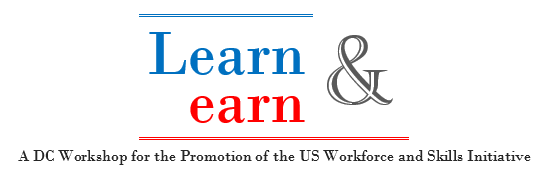Learn & Earn
The February meeting of “Learn & Earn: A Young Leaders’ Group for the Development of the U.S. Workforce” featured Jamell Thrower, Program Manager at the DC Department of Employment Services’ Office of Apprenticeship Information & Training, who was accompanied by a current apprentice. The discussion focused on the practical implementation of apprenticeship programs at the local government level. The District of Columbia has a mandatory apprenticeship law that requires any contractor whose contract amount is $500,000 or more on a single contract or cumulative contracts within a twelve month period to register an apprenticeship program with the DC Apprenticeship Council. Moreover, 35 percent of apprenticeship hours worked on any government-assisted project that is $300,000 or more must be performed by DC residents.
Registered apprenticeship program sponsors are responsible for developing the conditions and curriculum of their apprenticeship programs. However, these standards have to meet specific regulations set by the District. The DC Office of Apprenticeship provides guidance and a list of minimum standard items required for submitting proposed apprenticeship standards.
The length of the apprenticeship programs ranges from one to five years, depending on the job. For each year of the apprenticeship, apprentices will receive approximately 2,000 hours of on-the-job training and a minimum of 144 hours of classroom instruction. Sponsors provide and organize classroom instruction at community colleges or at specialized schools. In addition, apprentices are paid a wage that increases as they advance through their program. At the end of the program, they receive an apprenticeship completion certificate that is a recognized credential in their field.
The “step-up” initiative is a tool that allows individuals who lack certain apprenticeship eligibility requirements to register as apprentices with sponsors for up to a twelve month training period. This system allows those individuals to get an insight into the apprenticeship training system, prepare for the entrance exam of a registered apprenticeship program, and gain a range of practical skills. After the twelve month period, step-up apprentices who meet the eligibility requirements can specialize in a registered apprenticeship program.
Most apprenticeship programs currently available are within traditional industries such as construction and manufacturing. In DC, 95 percent of the apprenticeship programs are in the construction field. However, new opportunities are also emerging in transportation, health care, and information technology.
Information about the working group:
The American-German Institute (AGI) at Johns Hopkins has been working on bringing together a number of different actors concerned with workforce development in the U.S. to encourage sharing of ideas, learning lessons from different countries, seeing what challenges lay ahead, and where further cooperation is needed to encourage public-private partnerships towards promoting specialized skills training opportunities.
“Learn & Earn” is a working group of young professionals from a variety of different sectors and backgrounds (energy, education, finance, industry, manufacturing, etc.) that gather monthly to discuss the role of workforce training in economic development around the world.
Past events:
- June, 2014: Robert Dehm from the German Embassy’s Economic Department presented the German Embassy’s Skills Initiative.
- July: Zach Boren, Senior Advisor at the U.S. Department of Labor’s Office of Apprenticeships, explained how they are trying to brand apprenticeships to an American audience.
- August: Max Grünig, Senior Fellow of Ecologic, led a discussion on the growth of green industry in Europe and the U.S. and how that has spurred growth of apprenticeship programs in that field.
- September: Katie Gage from Enstitute talked about her nonprofit organization and the challenges they run into in recruiting young applicants.
- October: Dr. Achim Dercks, Deputy Chief Executive Officer of the Association of German Chambers of Industry and Commerce, presented on the role of domestic institutions on developing sustainable apprenticeship programs, during our first field trip to the Representative of German Industry + Trade (RGIT).
- November: Kimberly Frank, Parke Nicholson, and Sarah Steinberg debriefed on their site visits to apprentice programs in Hungary, France, Germany, and the UK, and lessons learned for the U.S.
- December: Dana Hendrickson, Director of Outreach and Advocacy at the Maryland Department of Veteran Affairs, led a discussion on efforts in the U.S. and Maryland to re-integrate military veterans into the workforce.
Please tweet any relevant articles using #learnandearn, or feel free to post any articles that might be relevant to the LinkedIn group “Learn & Earn: A Young Leaders’ Group for the Development of the U.S. Workforce.”
Location
AICGS
1755 Massachusetts Avenue, NW Suite 700 Washington, DC 20036 United States







